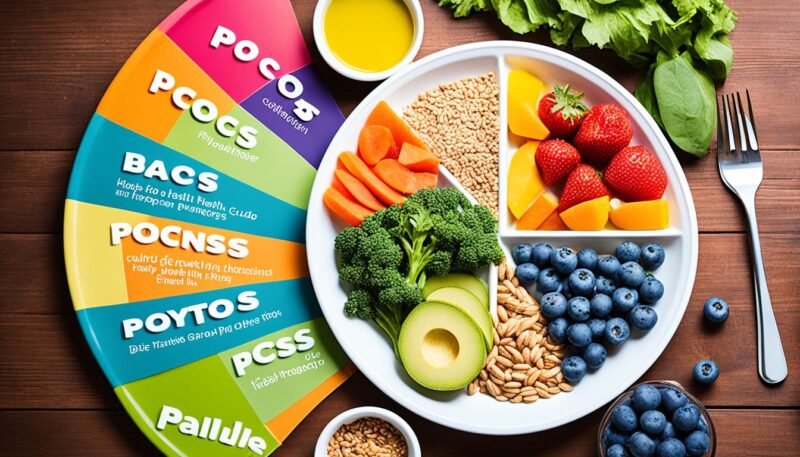Living with PCOS can be tough. I know the difficulties firsthand. The physical and emotional struggle of PCOS is real. But there is light at the end of the tunnel.
When I found out about my PCOS, I was overwhelmed. Weight gain and fatigue were my daily battles. It all changed when I started focusing on my diet and exercise.
A healthy PCOS diet and workout plan turned things around. I’ve improved my weight and energy levels. Plus, my PCOS symptoms have gotten a lot better. It has truly been a life-changing experience.
In this guide, I’ll show you the best strategies for PCOS. From meal plans to workouts, I’ve got you covered. You’ll have all the info you need to take charge of your PCOS and your health.
Remember, everyone’s PCOS journey is different. What works for me may not work for you. Always listen to your body and talk to a doctor before big changes in your lifestyle.
Ready to start this journey with me? Let’s see how diet and exercise can make a real difference in managing PCOS. And how it can lead to a healthier, more balanced life.
Key Takeaways:
- Implementing a healthy PCOS diet and exercise routine can help manage symptoms and improve overall health.
- Consult with a healthcare professional before making any significant changes to your diet or exercise routine.
- Every person’s experience with PCOS is unique, so it’s important to listen to your body and find what works best for you.
- This comprehensive guide will provide you with the tools and knowledge you need to take control of your PCOS and achieve optimal health and balance.
- The transformative power of diet and exercise can help you reclaim your health and improve your quality of life.
Why Diet is Important for PCOS
People with PCOS have a higher chance of obesity and other serious health issues. These include diabetes and heart problems. Eating the right things is vital for managing PCOS and staying healthy. A good diet can ease symptoms and lower the risk of complications.
The Mediterranean Diet for PCOS
The Mediterranean diet is top notch for those with PCOS because of its many benefits. It focuses on a mix of foods but cuts out things like saturated fats and refined sugar. With lots of non-starchy veggies, lean proteins, and minimal dairy, this diet really fits PCOS management.
Its anti-inflammatory nature helps tackle PCOS-related inflammation. By sticking to this diet, PCOS folks can cut down the risk of heart issues.
Foods to Avoid with PCOS
Avoiding certain foods is key to managing PCOS better. Stay away from fried foods, red meat, and sugary drinks among others. These can up the risk of heart disease and other serious problems in PCOS patients.
Best Foods for PCOS
On the flip side, some foods really help with PCOS management. Think omega-3 rich fish like salmon and healthy olive oil. They fight inflammation and keep blood sugar level. Beans, veggies, whole grains, and fruits are also a big plus. They provide nutrients, fiber, and steady energy. This helps with symptoms and general well-being for those with PCOS.
So, adding these foods to your daily meals can make a big difference if you have PCOS.
Best Foods for PCOS
A well-balanced diet is key in managing PCOS. The right foods can cut inflammation and balance hormones. Let’s look at some top foods:
1. Omega-3 Rich Fish

Fish such as salmon and sardines are rich in omega-3. They help reduce PCOS-related inflammation. These fish also support hormone regulation and overall health.
2. Olive Oil
Choose olive oil over saturated fats like butter. Olive oil is full of healthy fats that stabilize blood sugar and cut inflammation. It’s a great pick for cooking and salad dressings.
3. Beans and Legumes
Beans and legumes are top for getting protein without the red meat fat. Chickpeas, black beans, and lentils are great examples. They offer protein and fiber to your diet.
4. Non-Starchy Vegetables
Non-starchy veggies like broccoli, spinach, and bell peppers are vitamin-packed. They’re low in calories but full of fiber. Add a variety of these to your meals for lots of nutrients.
5. Whole Grains
Opt for brown rice, quinoa, and barley over refined grains. Whole grains lower blood sugar spikes and offer lasting energy. They’re great for digestion too.
6. Whole Fruits
Choose whole fruits instead of sugary desserts. They’re full of fiber that slows sugar absorption. Berries, apples, and oranges are great choices for added nutrition.
Adding these foods to your diet can help with PCOS symptoms. For the best advice, talk to a professional or a dietitian for a plan that works for you.
Foods to Avoid with PCOS
When dealing with PCOS, watching your diet is key. You should avoid certain foods that could make your symptoms worse. This helps reduce your chance of other diseases as well. By picking what you eat carefully, you can handle your PCOS better and stay healthy.
Fried foods: French fries and chips are full of bad fats. They can cause your body to get inflamed. Try to cut down on or not eat fried foods.
Saturated fats: Butter and margarine have fats that can make you more inflamed. They also up your risk of heart disease. Go for healthier fats like those in olive oil instead.
Red meat: Things like hamburgers have a lot of saturated fats. They can make inflammation worse. Try eating more lean proteins like chicken, fish, or vegetarian options.
Processed snacks: Treats like cakes and cookies are full of added sugars and bad fats. They can make your blood sugar go up and cause inflammation. Try to snack on whole foods instead.
Sugary beverages: Drinks such as sodas are full of calories with no real nutrients. They can make you gain weight and be more inflamed. Go for water, unsweetened tea, or water with fruit in it.
Alcoholic beverages: Alcohol can throw off your hormones and make you gain weight. It’s not great for your liver health either. Drink less or avoid alcohol to better handle your PCOS.
Refined flour: Things like white bread can make your blood sugar spike and cause inflammation. Choose whole grains, like whole wheat products, to keep your blood sugar steady.
White rice: White rice acts like refined flour. It doesn’t have as many good things for you as whole grains do. Try brown rice or quinoa for more nutrient-rich options.
Steering clear of these foods is good for your PCOS and your health in general. It’s important to note that individual foods don’t cause PCOS. But eating the right things can make a big difference in how you feel and your health over time.
Exercise and its Importance for PCOS
Exercise is key for managing PCOS, especially for insulin resistance and losing weight. With PCOS, your body may have trouble using blood sugar for energy. This is often due to not being active and being overweight.
Regular exercise can boost how your body uses insulin and shed weight. Studies show that hard workouts and eating well are best for lowering BMI and fighting insulin resistance in PCOS.
Different exercises work well for PCOS. Things like walking, jogging, or cycling help your heart and burn calories. HIIT is also good. It means exercising at your toughest, then resting. This can make your body use insulin better and burn fat.
Yoga and Pilates can lower stress and feel good for women with PCOS. They mix physical movement with mental calm. This helps in a deeper way with PCOS care. Also, building muscles through strength training speeds up burning calories even when you’re resting.
Finding fun exercise that you can do regularly is key for PCOS. It could be daily walks, HIIT classes, yoga, or lifting weights. The important part is picking something that fits your taste and life well.
But exercise alone isn’t enough for PCOS. A good diet is essential too. Together, they let you manage your PCOS better. They can help make your insulin work better, help you lose weight, and feel healthier.

Recommended Exercise for PCOS
Exercise is vital in managing PCOS, improving insulin resistance and helping with weight loss. It’s important to choose exercises you enjoy and can stick with. This ensures you benefit from them over time.
Aerobic activities, such as walking, cycling, dancing, or aerobics, are great for your heart and burning calories. They boost cardiovascular health and aid in weight loss. For those with PCOS, this is crucial. Aerobic exercises also lower insulin resistance and better how your body uses glucose.

Aerobic exercises for PCOS:
- Walking
- Riding a bike
- Dancing
- Aerobics classes
High-intensity interval training (HIIT) is another good option for PCOS. It improves how your body responds to insulin and burns fat. With HIIT, you do intense exercises in short bursts, followed by rest. You might run, cycle, or do bodyweight exercises with HIIT.
HIIT exercises for PCOS:
- Running sprints
- Cycling sprints
- Bodyweight HIIT exercises
Interval training is yet another approach for PCOS. It mixes up your workout intensity. This might mean alternating between brisk walking and jogging or changing cycling speeds. It enhances your heart health and helps burn calories.
Interval training exercises for PCOS:
- Walking and jogging intervals
- Cycling at different speeds
Mind-body exercises such as yoga, Pilates, and tai chi are beneficial for individuals with PCOS. They lessen stress, boost flexibility, and encourage mindfulness. These exercises can also ease PCOS symptoms like irregular periods and excess hair.
Mind-body exercises for PCOS:
- Yoga
- Pilates
- Tai chi
Strength training is crucial for PCOS management. It helps in building muscle, which increases your metabolism and betters your body’s overall look. You can use free weights, resistance machines, or do bodyweight exercises for strength training.
Strength training exercises for PCOS:
- Free weights
- Resistance machines
- Bodyweight exercises
Finding a mix of enjoyable exercises is key. Always strive to keep your workouts fun and engaging. Listen to your body, pick an exercise level that fits your needs, and increase over time. Staying active and sticking to your exercise plan is essential for managing PCOS.
The Role of Diet in PCOS Management
Diet is really important in managing PCOS, especially with some exercise. A good diet can lower weight, stomach fat, and insulin levels in women with PCOS.
If you’re too heavy, eating 500 to 1,000 fewer calories a day can help you lose weight. But, don’t cut calories too much. It might mess with your hormones.
Key Dietary Changes for PCOS
There are special foods that can help with PCOS. These changes can make symptoms better and help your overall health:
- Reduce Total Fat Intake: It helps to eat less high-fat food for managing weight. Try getting fats from healthy sources like avocados and nuts.
- Avoid Saturated Fats and Trans Fats: Bad fats can cause inflammation and heart issues. Go for good fats like those in olive oil and fish.
- Incorporate Fiber-Rich Foods: Fiber fills you up, keeps blood sugar steady, and helps with weight. Eat lots of fruits, veggies, grains, and legumes.
- Choose Whole Grains: Whole grains like brown rice and whole wheat bread are better than refined ones. They keep your blood sugar level and are healthy.
- Opt for Lean Proteins: Eat lean meats like chicken and fish instead of fatty ones. Also, try tofu and beans for protein without the bad fats.
Eating a balanced diet with lots of good nutrients and the right calories is crucial for PCOS and health in general.

Sample Eating and Workout Plan for PCOS
It’s important to have a good plan for eating and working out to handle PCOS well. This plan combines healthy meals and exercise to help with PCOS.
Eating Plan:
1. Add lean proteins to your diet. Things like skinless chicken, turkey, fish, or tofu work well.
2. Use healthy fats when you cook. Olive oil, avocado, and nuts are better than saturated fats.
3. Load up on veggies. Eat a lot of veggies that aren’t starchy, like spinach, broccoli, and kale.
4. Go for whole grains. Eat whole grain foods such as brown rice, quinoa, and whole wheat bread over refined grains.
5. Eat colorful fruits. Foods like berries, apples, and melons are good for you because they’re full of vitamins and fiber.
6. Do more fiber. Eat foods with lots of fiber such as beans, chia seeds, and flaxseeds to help your digestive system and control blood sugar.
7. Make sure you get enough vitamin D. Try to eat foods that have a lot of this vitamin, like fatty fish, eggs, and fortified dairy. Or ask your doctor about taking supplements.
8. Use cinnamon. You can make meals or drinks healthier by adding cinnamon, which is good for your body’s use of insulin.
Pay attention to how many calories you eat for your own needs. Also, it’s always best to talk with a nutrition expert or a doctor about what’s right for you.
Workout Plan:
1. Exercise regularly. Try to work out for 30 minutes a day doing exercises that make you breathe hard but don’t push yourself too much.
2. Do heart-healthy exercises. Include things like walking, jogging, cycling, or swimming in your routine to make your heart stronger.
3. Lift some weights. Use things like dumbbells, resistance bands, or just your body weight to get stronger and burn more calories.
4. Relax and focus your mind. Add things like yoga or Tai Chi to your workouts to lower stress and feel better overall.
5. Keep up with your workouts. Mix up the types of exercises you do but always include cardio, strength training, and relaxation exercises you like.
6. Be aware of how you feel. Make sure you enjoy your workouts and that they don’t make you feel bad or hurt. Adjust as needed, especially if you have a health issue.
Finding workouts you enjoy and can do regularly is crucial. Always check with a doctor first, especially if you have special health needs or worries.

By sticking to this eating and workout guide, you can help manage your PCOS and feel better. Remember, listen to your body, make changes when necessary, and get advice from health pros along the way.
Learn more about managing PCOS through diet and exercise.
Exercise, PCOS, and Fertility
Exercise is key in handling the effects of PCOS on fertility. Many women with PCOS face the problem of not ovulating, which often leads to infertility. However, keeping up with regular exercise and shedding at least 5% of body weight can help with ovulation and make menstrual cycles more regular.
Studies have found that exercise and losing weight work better together for women with PCOS and infertility than just dieting. Exercise boosts how the body uses insulin, which is big in PCOS, and it aids in losing weight. By dealing with these main issues, exercise can get ovulation back to normal and raise the possibilities of getting pregnant.
It’s crucial to talk with a healthcare provider for advice on exercise and lifestyle changes right for you. They’ll offer the best steps, tips, and help to increase your chances of pregnancy and handle PCOS symptoms.
Image:

When to Seek Medical Advice for PCOS and Exercise
Before you start exercising, talk to your doctor first. This is especially true if you have other health problems. Things like arthritis or heart issues need special attention. Your doctor can tell you the best types of exercise and how hard to work out. They will make sure it’s safe and matches your health needs and goals.
Putting your health first is very important, especially when dealing with PCOS and exercise. Your doctor will make sure the exercise you pick is right for you. They’ll help you avoid any dangers and make the most out of your efforts.

If you need more details on PCOS and how to manage it, visit the Mayo Clinic. They have lots of information on ways to deal with PCOS through diagnosis, treatment, and lifestyle changes.
When to Consult a Personal Trainer for PCOS
If you’re not active or don’t know if certain exercises are safe, a personal trainer can help. Look for one  certified to work with medical conditions, such as PCOS. They should be able to create an exercise plan that’s safe and effective just for you.
certified to work with medical conditions, such as PCOS. They should be able to create an exercise plan that’s safe and effective just for you.
Make sure your personal trainer is certified by groups like the American Council on Exercise. Or, they could be certified by the National Academy of Sports Medicine, or the National Strength and Conditioning Association.
Conclusion
Managing PCOS means looking at the big picture. Change your lifestyle with exercise and diet. For women with PCOS, regular, intense aerobic exercise helps with insulin resistance and losing weight. Try activities like walking, cycling, or HIIT to better use blood sugar for energy and to lose weight.
A balanced diet is key in battling PCOS symptoms and staying healthy. Avoid foods that cause inflammation, like fried foods and sugary drinks. Instead, focus on healthy choices such as lean proteins, veggies, whole grains, and fruits. These foods reduce inflammation, balance hormones, and promote wellbeing.
Working with your doctor or a specialist in PCOS is vital for a tailored exercise and diet plan. They can recommend the right exercises and goals that fit your health and lifestyle. Stick to these changes with regularity to manage PCOS, reduce symptoms, and boost your health in the long run.














